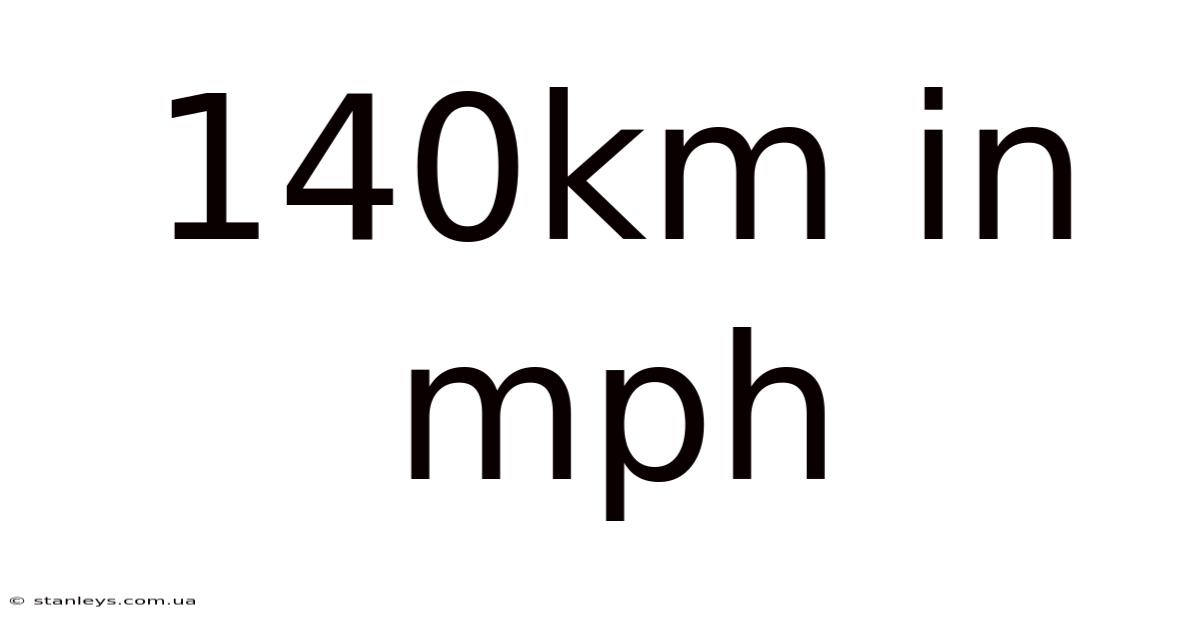140km In Mph
stanleys
Sep 16, 2025 · 5 min read

Table of Contents
Converting 140km to mph: A Deep Dive into Unit Conversion and its Applications
Understanding how to convert units is a fundamental skill in many fields, from everyday life to advanced scientific research. This article will thoroughly explore the conversion of 140 kilometers (km) to miles per hour (mph), explaining the process step-by-step, delving into the underlying principles, and highlighting the practical applications of this type of conversion. We'll also tackle some common questions and misconceptions surrounding unit conversions.
Understanding the Units: Kilometers and Miles Per Hour
Before diving into the conversion, let's define the units involved. Kilometers (km) are a unit of distance in the metric system, while miles per hour (mph) is a unit of speed or velocity, representing the distance traveled in miles within one hour. The key difference is that kilometers measure distance, while mph measures distance over time. This distinction is crucial for accurate conversions.
The Conversion Process: From Kilometers to Miles Per Hour
To convert 140 km to mph, we need two key conversion factors:
- Kilometers to miles: 1 kilometer is approximately equal to 0.621371 miles.
- Hours to hours: This conversion is straightforward; 1 hour = 1 hour. We don't need to convert the time unit in this specific problem since the original speed is not given. However, if we were converting from km/minute or km/second, we would need to factor in the time conversion.
Step-by-Step Conversion:
-
Convert kilometers to miles: Multiply 140 km by the conversion factor: 140 km * 0.621371 miles/km ≈ 87.0 miles. Note that the "km" units cancel out, leaving us with miles.
-
Determine the time: The problem only gives us a distance (140km), not a speed. Therefore, we cannot directly convert to mph. To obtain mph, we need to know the time it took to travel 140km. Let's assume it took one hour.
-
Calculate miles per hour: If it took one hour to travel approximately 87 miles, then the speed is 87 mph. Therefore, if it took one hour to travel 140km, the equivalent speed is approximately 87 mph.
Important Note: If the time taken to cover 140 km was different from one hour, the mph would be different. For example:
- If it took 2 hours: The speed would be approximately 87 miles / 2 hours = 43.5 mph.
- If it took 0.5 hours (30 minutes): The speed would be approximately 87 miles / 0.5 hours = 174 mph.
Therefore, simply stating that 140km is equal to a specific mph is inaccurate without knowing the time taken to cover that distance. The conversion only applies to the distance component.
Deeper Dive: Understanding the Conversion Factors
The conversion factor 0.621371 miles/km is derived from the precise definition of a mile and a kilometer. A mile is approximately 1609.34 meters, and a kilometer is 1000 meters. Therefore, the conversion factor is calculated as:
1 mile / 1609.34 meters * 1000 meters / 1 km ≈ 0.621371 miles/km
This factor allows us to seamlessly move between the metric and imperial systems for distance measurements.
Practical Applications of Unit Conversion
Understanding unit conversions is crucial in many real-world scenarios:
- Travel: Converting kilometers to miles (and vice-versa) is essential when navigating different countries with varying unit systems.
- Science and Engineering: Consistent unit usage is critical for accurate calculations and data analysis across various scientific disciplines.
- Everyday Life: Converting units like temperature (Celsius to Fahrenheit), weight (kilograms to pounds), and volume (liters to gallons) are common tasks in everyday life.
- International Trade: Accurate unit conversion is crucial for international trade to ensure consistent product specifications and pricing.
- Aviation and Navigation: Pilots and air traffic controllers rely on precise unit conversions for navigation, speed calculation, and altitude measurements.
Frequently Asked Questions (FAQ)
Q1: Why is the conversion factor not a whole number?
A1: The conversion factor isn't a whole number because the mile and kilometer are defined independently, with no simple whole-number relationship between them.
Q2: Are there online calculators for unit conversions?
A2: Yes, many online calculators can quickly perform various unit conversions, including kilometers to miles and miles per hour calculations. These are useful tools for verifying calculations and saving time.
Q3: What if I need to convert from km/sec to mph?
A3: This requires a two-step conversion:
- Convert km to miles: Use the factor 0.621371 miles/km.
- Convert seconds to hours: There are 3600 seconds in an hour (60 seconds/minute * 60 minutes/hour). You would multiply the speed in km/sec by this factor to convert to km/hour, then convert to miles/hour using the kilometer-to-mile conversion factor.
Q4: Is there a significant difference between using the approximate conversion factor (0.62) and the more precise one (0.621371)?
A4: The difference is minimal for everyday calculations. However, for scientific applications or situations requiring high precision, using the more precise factor is crucial to avoid accumulating errors.
Conclusion: Mastering Unit Conversions
Converting 140 km to mph requires understanding the distinction between distance and speed. While we can convert the distance part, the conversion to mph is dependent on the time taken to travel the given distance. Mastering unit conversions is a valuable skill applicable across various fields, emphasizing the importance of precision, understanding the underlying principles, and utilizing appropriate conversion factors. This process underscores the importance of clear problem definition and the need for all necessary information before undertaking conversions involving rates and speed. Remember to always consider the context of the problem and choose the appropriate level of precision for the conversion factor.
Latest Posts
Related Post
Thank you for visiting our website which covers about 140km In Mph . We hope the information provided has been useful to you. Feel free to contact us if you have any questions or need further assistance. See you next time and don't miss to bookmark.